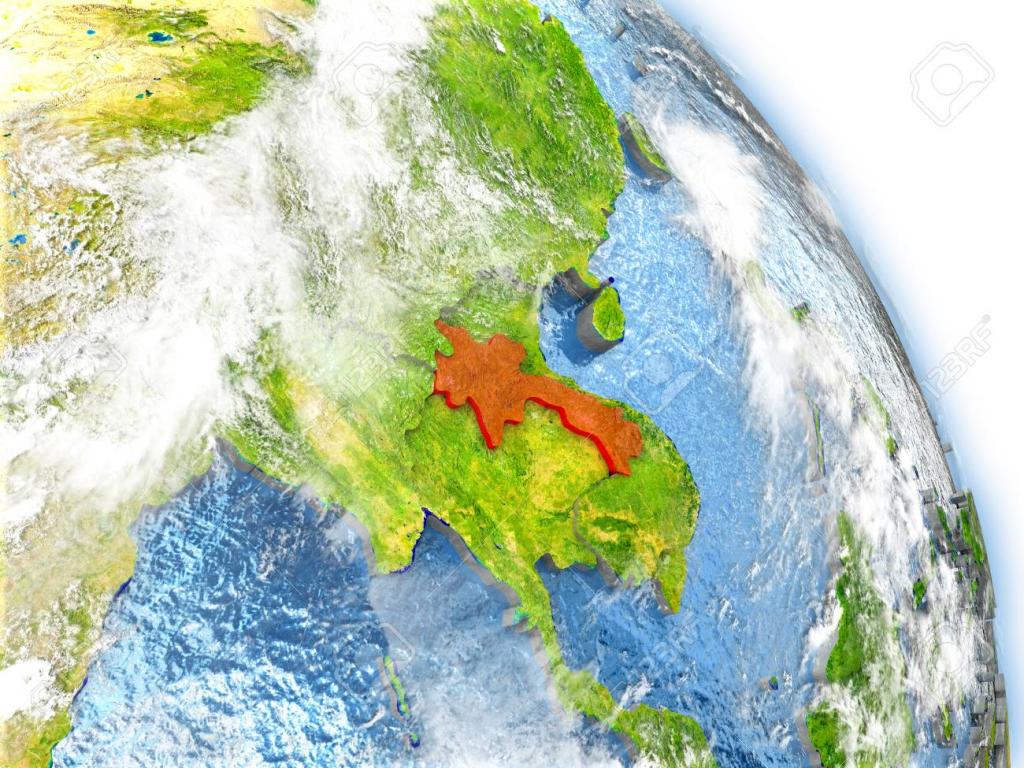Laotians Reflect on Life After Death
Buddhists Stress End of Suffering, Enlightment, and Spirit
Larry Reddick came from Kansas January12 to give a eulogy in honor of his uncle, Ed Reddick, saying that the 200 family and friends assembled at the small National Memorial Park Chapel in Falls Church, Virginia, were there to “celebrate Ed’s life.” He mentioned the tours of duty that Ed, a Foreign Service Officer, had spent with his family in countries around the world, including Ecuador, Laos, Kenya, Bolivia, France, Germany, and Thailand. When Ed retired from the Department of State, he settled in Virginia with his Laotian wife of 36 years, Sandy Sengchanh, and their three grown children.
Venerable Dr. Harold Ward, a retired chiropractor and a monk for three years at the Wat Lao Buddhavong Laotian temple in Catlett, Virginia, agreed that this was a celebration of what he called “a new life.” He was one of the ten Laotian monks who officiated at the funeral ceremonies. Explaining the meaning of death, he said that the basic teaching of Buddhism was that existence was suffering, whether birth, daily living, old age or dying – but suffering relieved in the hope of attaining Nirvana.
That state of eternal enlightment, also called Nibbana, includes the extinction of personal striving and craving. He mentioned also the expectation of rebirth or reincarnation, either in this world, in heaven, or in another plane of existence, possibly as a spirit. According to Buddhist philosophy, these were the three possibilities of existence after death.
Funeral Rituals
To reach the best level of existence after death, Dr. Ward, who speaks fluent Laotian, recommended meritorious acts in life. Righteous behavior resulted in good deeds, which, in turn, helped better the condition of the deceased. Good fortune could also bless members of the family. To die, he said, is to have no more attachment to life. To die is to be free of suffering. To die is to become a spirit.
However, wrongdoing in one’s lifetime also determined people’s fate. Venerable Ward expressed the hope that a person’s last thoughts would be directed to Buddha’s precepts or moral rules. That was why family members did whatever they could to ease the departure of the deceased. They wore white clothes to show detachment from worldly desires and help purify their loved one. Religious leaders and relatives performed prayers and chants to facilitate the passage of the soul to a pure land.
Traditionally, said Dr. Ward, a bathing ceremony takes place in which relatives and friends pour water over one hand of the deceased. They next place the body in a coffin surrounded by wreaths, candles and incense sticks. Monks chant and hold a piece of white cloth or a broad ribbon attached to the coffin to give the dead contact with the sutras, or prayers, and gain merit in their new life. Food offered to the officiating monks makes a valuable contribution to the cleansing procedure. Ideally, the body is finally cremated, cut off in this way from the world, though not to be forced to re-enter an after world or reincarnated into another being. It becomes a spirit.
Wat Lao Buddavong
In 1985, Lao Buddhists in the Washington area built a magnificent temple, which sits on a 58-acre piece of land in Faulkier County, Virginia. Ed and Sandy Reddick were among the first contributors. The congregation invited a Lao Abbot to head the Wat. He, four resident monks, and a number of visiting monks have been devoting their lives to the social and spiritual needs of their disciples ever since.
The Wat’s spacious prayer hall, which can hold 400 people, is filled with large Buddha statues and colorful religious decorations, mostly imported from Laos and Thailand. The monks teach doctrine, religion, sutras, and meditation to their devotees, especially on week-ends. Temple members, among them Sandy Reddick, regularly volunteer to teach the Lao language, Lao classical dance, music, culture, not only to Laotians but also to Americans, both adults and children.
Buddhists believe in doing good deeds in order to prepare themselves better for the after-life. Kayasith Rattanavongkoth, President of the Lao-American Association in the Washington Area, established 25 years ago, said the majority of the 12,000 Lao residents were very close. They supported each other in times of need and crisis and helped one another become good American citizens.
Vilay Chaleungrath, Executive Director of Newcomers Community Service Center in the capital district, gives the example by providing basic English skills and vocational training to refugees and immigrants. His goal is to help newcomers become self-sufficient, get them jobs, and do good deeds.
To Larry Reddick, his uncle was part of this tradition. “Uncle Ed was a selfless man whose generosity and patience meant that he always thought of others before he thought of himself. But most of all, he loved making people happy, with his sense of humor and his contagious smile.” Larry closed his eulogy with a poem by Henry Van Dyke:
Time is too slow for those who wait.
Too swift for those who fear,
Too long for those who grieve,
Too short for those who rejoice,
But for those who love, time is eternity.
Hours fly, flowers die,
New days, new ways pass by,
Love stays.
